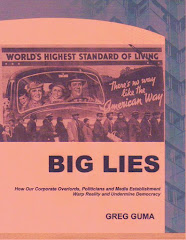 |
| Councilors Vince Dober and Sharon Bushor confer during debate over basing F-35 jets at the airport. |
Add to that the pending decision on whether to base 18 to 24 F-35
fighter jets at the Burlington International Airport despite popular opposition
and, in several cases, local votes either in opposition, or at least requesting
more information before any decision is made. The truth is, hearings may bring
out the opposition, but state and national leaders made up their minds long
ago. And their argument is that the economic benefits outweigh any costs,
including the sacrificing of more than a thousand homes.
But in the end it's not even up to them. The Air Force will make
the call. So, will they get to simply roll over discontent? After all, it's a cheap
place to put these flying Edsels. Plus, they get to assert military prerogative,
even if it makes big parts of the Burlington metropolitan area essentially a
national sacrifice area -- a place made uninhabitable in the name of national
security.
This video reveals the dynamic as it unfolded during a public hearing in South
Burlington. The beginning is a bit painful to watch, as boosters play the
patriotism card or simply pander. But after a while the opposition has its say. One month later -- and two days before the deadline for public comments on an
environmental impact statement -- members of the Burlington and Winooski city
council voted to ask for more information about the impacts of basing the
planes in Vermont.
In Burlington three resolutions were
debated for almost two hours after more than 40 people expressed their opinions
during yet another public forum. The resolution that ultimately passed
(unanimously, after two others failed) incorporated arguments from both sides,
listed a series of unanswered questions, and requested that the Air Force bring
an actual F-35 to the airport “so that residents can experience the actual
noise level.”
As if that will ever happen. Anyway,
here's a link to the VTDigger feature:
But that isn't the last example of federal overreach -- and
the state's so far moderate response. Not exactly resistance, but an attempt to
find a middle way.
Despite the state's generally strong education reputation -- mostly high
scores on assessment tests, along with good faith efforts and a bit of innovation -- it finds
itself at odds with the federal government over policy and practice, and
specifically whether policy decisions and funding should be determined by
testing.
It will not get a piece of the $5 billion in new federal “Race to the
Top” funding being distributed to improve assessment, reward teacher excellence
and help poorly performing schools. Last November it was also turned down for a $50
million early-childhood education grant, and has been unable to get a waiver
from the No Child Left Behind (NCLB) law.
A new report card from the American Legislative Exchange Council (ALEC) meanwhile gives the state a "reform grade" of D+ and an F for
"Identifying Effective Teachers." Florida, which consistently ranks
near the bottom in national assessments, received a B+ in the same report.
In early June Sen. Bernie Sanders complained to US Education Secretary Arne Duncan about the exclusion of Vermont and other rural states from “Race to the Top” funding. Sanders and Duncan also discussed the rejection of Vermont’s NCLB waiver request. Sanders argued that requirements of the Bush-era initiative are “fundamentally incompatible with the state’s educational model,” and described opposition to the law as “near unanimous.”
This is also a national security story. In doing research for my recent pieces on education, race and achievement gaps, I came upon “US Education Reform and National Security,” a new report from the Council on Foreign Relations. It was authored by a panel headed by former Secretary of State Condoleeza Rice and Joel Klein, chancellor of New York’s public schools. Klein has opened a hundred charter schools, in many cases ignoring community opposition.
This is also a national security story. In doing research for my recent pieces on education, race and achievement gaps, I came upon “US Education Reform and National Security,” a new report from the Council on Foreign Relations. It was authored by a panel headed by former Secretary of State Condoleeza Rice and Joel Klein, chancellor of New York’s public schools. Klein has opened a hundred charter schools, in many cases ignoring community opposition.
 |
| "Mama, I can't sleep. The F-35s are too loud." (Lisa Cowan graphic) |
Its reform recommendations include adoption of Common Core
standards, already foisted on 45 states without ever being
tested -- and to be used as a standard for future federal funding. They
also want an expanded curriculum geared to national security that stresses
science, technology and foreign languages; competition-based changes like
charter schools and vouchers that let students and families choose which
schools they attend; and a “national security readiness audit” that holds educators
and policy makers responsible for meeting national expectations.
In a dissenting opinion included at the end of the report,
Stanford University professor Linda Darlington-Hammond challenged the
assumption that competition and privatization are essential strategies. “It
ignores the fact that the nations that have steeply improved achievement and
equity and now rank at the top….have invested in strong public education
systems that serve virtually all students,” she wrote. In education the
highest performing countries are Finland, Singapore and South Korea, allies
that pose no threat to US national security.
In contrast, she adds, nations like Chile that have aggressively pursued
privatization “have a huge and growing divide between rich and poor that has
led to dangerous levels of social unrest.”
Another dissenting member of the panel, Harvard’s Stephen M.
Walt, pointed out that US schools still rank among the top 10 percent of the
world’s 193 nations. “There are good reasons to improve K-12 education, but an
imminent threat to our national security is not among them,” he concluded.
Whether Vermont eventually moves toward a “national security readiness
audit” may depend on whether that becomes part of an expanded Common Core curriculum,
and whether it is linked to funding. But the state’s lack of charter schools is
clearly a key reason for its low score from ALEC, while its opposition to
annual testing was a factor in blocking the waiver from No Child Left
Behind.
Instead, the state considered legislation this year to provide
“flexible pathways to graduation.” They include dual enrollment, virtual
learning, and work-based learning. The legislation did not pass, mainly due to
disagreement about the funding source, but there was general support for the
concept. The strategies include personalized learning plans, proficiency-based
advancement, career and college readiness, 21st century skill development, and
improved learning outcomes. Another attempt to pass the proposal is expected
during the next legislative session.
There's more to the story, discussed in a new VTDigger report:
What I keep wondering is whether (and when) the cumulative effect of these tensions -- over whether the state can close a nuclear plant it doesn't want and that may even be damaging the health of its citizens, whether the Air Force can unilaterally make a basing decision that devalues thousands of homes or makes them completely uninhabitable, and whether federal bureaucrats can force local schools to adopt punitive and skewed school standards, just to name three -- will produce something more lasting than public outrage.
You know, like a realistic strategy to change the outcomes and truly challenge illegitimate federal power plays.
What I keep wondering is whether (and when) the cumulative effect of these tensions -- over whether the state can close a nuclear plant it doesn't want and that may even be damaging the health of its citizens, whether the Air Force can unilaterally make a basing decision that devalues thousands of homes or makes them completely uninhabitable, and whether federal bureaucrats can force local schools to adopt punitive and skewed school standards, just to name three -- will produce something more lasting than public outrage.
You know, like a realistic strategy to change the outcomes and truly challenge illegitimate federal power plays.































No comments:
Post a Comment